Heating & Cooling Combined Unit: Why won't my air conditioner turn on?
Check the thermostat settings. Make sure that your air conditioner thermostat is set to Cool and the temperature setting is low enough to call for cooling.
If you have an electronic thermostat and it has no power, check the house circuit breaker for your air conditioning system. Reset the house circuit breaker if it's tripped.
If resetting the house circuit breaker doesn't restore power to the thermostat, then the thermostat may have failed. Replace the thermostat if it's getting power but won't power up. If you replace the thermostat and the air conditioner still won't work, you'll likely need to have a service technician examine and repair the air conditioner.
If the thermostat works and it set properly but the air conditioner won't turn on, the condensate drain float switch may be tripped because the condensate drain line is clogged and water is backed up in the drain system. Clear the clogged drain line so the float switch resets and allows the air conditioner to run.
Other problems that can prevent the air conditioner from running include a wiring failure, bad thermostat and a faulty electronic control board. A service technician typically needs to diagnose and repair these types of air conditioner failures.

THESE REPAIRS MAY HELP SOLVE YOUR HEATING & COOLING COMBINED UNIT PROBLEM
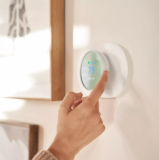
Replace the HVAC system thermostat
The thermostat controls the heating and cooling system in your home. The thermostat senses the temperature inside your home and cycles the system on and off to maintain the set temperature. When your HVAC system control thermostat quits working, replace the thermostat.
Hvac system thermostat
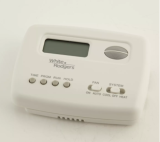
How to replace a heating and air conditioning system thermostat
If the buttons on your HVAC system control thermostat don't work or if the display panel doesn't light up, the thermostat may need to be replaced. This DIY repair guide explains how to replace a thermostat in less than 30 minutes.

Clear the condensate drain
Your central air conditioner or heat pump has a pipe that drains condensate water that drips from the evaporator to the outside of your home. If the drain pipe or condensate drain system gets clogged, water overflows the drain pan under the evaporator and starts dripping below the inside air conditioner unit. The overflowing condensate can cause water damage in your home.
Many central air conditioners have a drain float switch that shuts the system down if the drain is clogged and water backs up under the evaporator. If this switch trips, the air conditioner will shut down to avoid water damage.
If water drips from below the inside air conditioner unit and/or the air conditioner shuts down because the drain float switch tripped, then it's time to unclog the drain line.
You may be able to remove the clog with a shop vac. If not, you can use a plumber's snake to clear the drain line.
Watch our video Air Conditioner Not Cooling: Float Switches and Drain Pipe Clogs to learn more about fixing and preventing condensate drain system clogs.
To keep the condensate drain system from clogging up in the future, pour a cup of liquid bleach down the drain vent tube every month. The bleach kills mold and mildew that can build up inside the drain pipe and hose. To keep from killing the grass in your yard, stick a pan under the drain hose outside to catch the bleach as it runs out. And always remember to protect your eyes and skin when handling bleach and other harsh chemicals.
Clear the condensate drain

How to unclog the air conditioner drain line
Follow the steps in this repair guide to unclog condensate drain line for your central air conditioner. Water will drip under the inside AC unit when the drain is clogged.
Most common symptoms to help you fix your heating & cooling combined units
Choose a symptom to see related heating and air conditioning system repairs.
Thermostat problem, clogged air filter, burner failure…
Dirty air filter, clogged condenser coils, low refrigerant charge, faulty compressor…
Thermostat problems, bad compressor/condenser fan capacitor, lack of refrigerant, failed compressor…
Dirty flame sensor, failed flame sensor, damaged burner, bad high limit switch…
Main causes: errant thermostat settings, lack of electrical power, clogged drain line, wiring failure, control failure.…
Main causes: Errant thermostat settings, lack of power, bad interlock switches, lack of exhaust ventilation, wiring fail…
Most common repair guides to help fix your heating & cooling combined units
These step-by-step repair guides will help you safely fix what’s broken on your HVAC system.

How to unclog the air conditioner drain line
The condensate drain line for your central air conditioner can clog with mold and mildew. Water will back up and start d…
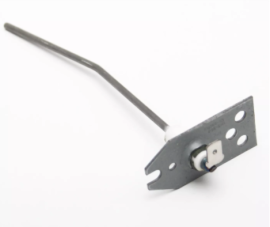
How to replace the furnace flame sensor
The flame sensor detects when furnace burner flames are lit. You may need to replace the flame sensor if flames only sta…

How to replace a heating and air conditioning system thermostat
The control thermostat for your HVAC system can stop working. This repair guide shows how to replace it.…
Effective articles & videos to help repair your heating & cooling combined units
Use the advice and tips in these articles and videos to get the most out of your HVAC system.
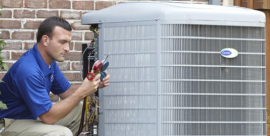
Learn how to maintain your central air conditioner to keep it running smoothly all summer long.…

Learn about all the convenient features on our Sears PartsDirect website that make your parts purchases easier.…
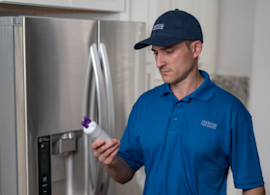
Get answers to frequently asked questions about Sears and Sears PartsDirect.…